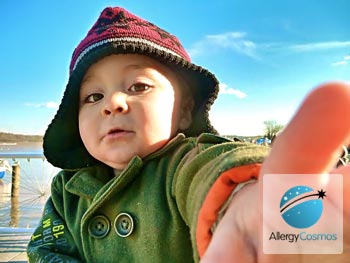What is it like living with eczema? There are many different types of eczema, and its appearance can also be very variable - even among individuals who have the same diagnosis. But certain features, such as skin irritation, are common to most forms of the condition.
Here's how atopic (allergic) eczema might look in a young child:
The initial symptom of atopic eczema is often a rash on the face, scalp or trunk appearing when a child is no more than two or three months old. The baby tends to rub or even scratch at the affected area, which makes it raw and 'weepy'. The rash might disappear, or it may spread to the body and limbs. Often it will settle in the creases of the elbows, wrists, buttocks, knees or ankles.
However, when living with eczema it should be kept in mind that atopic eczema is an unpredictable condition, affecting individual children in different ways. The rash can appear on any part of the body, although nearly every child with eczema has an affected patch in the crease beneath the earlobe while, conversely, some sites - such as the nose - are almost never affected. Has your child been affected like this?
If the condition persists as the child gets older (and, of course, eczema often clears up before adulthood) then the rash takes on a different distribution - is more often found on the surface of the body, rather than the creases. The hands are often affected, as are the neck, trunk, feet, and scalp in diffuse itchy patches.
The severity of atopic eczema varies widely at all ages. It may be no more than mild irritation, or it may be severely distressing and disabling. Its tendency to fluctuate over time can be frustrating, but it also means that there may be things you can do to modify the severity of 'flare ups' or even avoid them altogether, the main one practising strict allergen avoidance.
The itching problem
Few diseases cause such an intense urge to itch as living with eczema. However, itching can be a sign of many other illnesses, both physical and psychological, and should always be investigated by your doctor. Have you noticed how itching seems to become worse when you're tired or when the skin suddenly becomes cooler - typically on undressing? That's probably why an itch that's hardly noticeable during the day becomes suddenly unbearable at night. The natural response to an itch is to scratch it. But that's what causes much of the skin damage and distress associated with eczema. The scratching may relieve the itch but it does nothing to clear up eczema - it only makes the condition worse.
Vesiculation and crusting
In eczema, fluid leaks from tiny blood vessels beneath the skin, leading to the accumulation of tiny blisters called vesicles. Individually, a vesicle is almost invisible but together they give the skin a bubbling, boiling appearance known as vesiculation. The inevitable scratching will break the vesicles and fluid then exudes onto the skin surface itself, causing a 'weeping' appearance. As the fluid dries, it tends to coagulate, forming scabs.
Dryness, scaliness, and thickening of the skin
Even when the red, weeping rash is absent, the skin of someone with eczema has a characteristic appearance. Typically it is very dry, lacking the 'bloom' of healthy skin. If you are living with eczema, do you find that your skin smarts if it's exposed to soap and water? The surface of the epidermis - the outer layer of the skin - acts as protection from the outside world, rather like varnish on a piece of furniture. This surface layer normally flakes off and is replaced every day or so, without our being aware of it. In eczema though, it tends to crack and peel, giving the skin a scaly appearance. Meanwhile, scratching often leads to a thickening of the epidermis which leads to a leathery appearance.
Eczema also affects the skin cells which produce the pigment melanin, which gives our skin its tone. This often leads to a loss of pigment, so that people with eczema don't get a tan when exposed to the sun. It's also possible to get a release of pigment granules, which gives the skin a dirty, unwashed, appearance.
But living with eczema doesn't have to be this bad! Allergen and irritant avoidance and looking after your skin are the key to keeping away from those distressing flare-ups.




